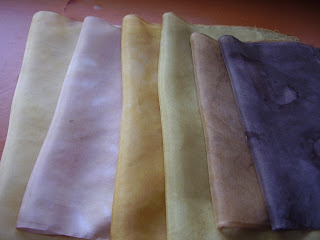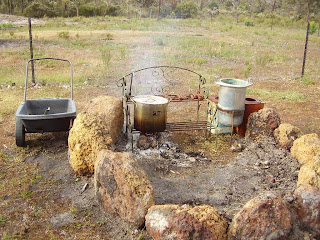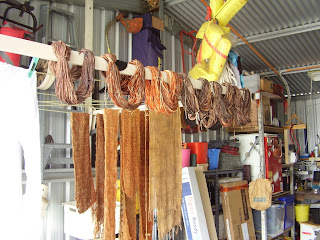Onion Skins
This is a copy of an article I wrote for Down Under Textiles magazine
it looks way prettier in print.
Article Number 3 should be out very very soon
Colour Is Everywhere
Why buy imported natural dye when there is such an abundance of colour in plant material surrounding us? Plant material to dye with is in our gardens, our kitchens, our parks, at the local florists, at the green grocers, you just need to get out there start collecting and test, test, test, everything, surprises happen.
Fabric
It is best to work with silk and wool fabric and fibres, at least to begin with as they are the easiest to dye naturally and will give the best results. I will cover the dyeing of cellulose (cotton, linen, hemp, and ramie) in a separate article. Start by using old articles of clothing, and blankets, visit the op shop or go to a school fete to provide yourself with some test materials.
Home Made Mordants
Mordants
Mordants assist dye to stay in the cloth, this is not always necessary e.g. in eucalyptus as these are a what is known as a substantive dye, but mordants are often used as colour modifiers. When working with Tasmanian Blue Gum for instance the use of iron promotes a shift to lovely purpley blues. And brown onions skins become a whole array of colours from, yellow, to rust to olive green.
The most common mordants are aluminium which brightens colours, copper tends to enhance and shift towards greens and iron darkens or saddens colours. There are many other substances that are used to assist dyeing e.g. cream of tartar, vinegar, I recommend acquiring a good book on natural dyes to explore this further.
There are several simple ways to mordant cloth. You can use pots of varying metals to cook in, e.g. aluminium, copper, iron, or you can add pieces of the metal to the pot while you are cooking e.g. rusty nails, beer bottle tops, pieces of copper pipe, or you can pre dissolve the metals and add the subsequent liquids/jellies to your pots. To do this place the pieces of copper, rust or aluminium (I save pieces of foil from things like butter, or re-use aluminium foil) in a jar fill with vinegar and leave to corrode, for at least a week the aluminium creates a jelly like substance, while the iron/rust foams up. Replace the vinegar as you use it. The iron can be strained to reduce the likelihood of spotting.
Vat or Pot Dyeing
Pots that you use for dyeing should never be used for cooking. Go op-shopping and pick up a couple of large aluminium and stainless steel pots. Glass and enamel are also useful, if the enamel has chipped this will add iron to the water and can be your iron pot. Cast iron pots from camping stores are great as well. While it is unusual to find a copper pot these days perhaps a brass or copper bowl or ornament could be placed inside a pot.
Never use an aluminium pot for dyeing or cooking an alkaline substance as it gives off a toxic gas. So if you wish to cook any fabrics up with washing soda to scour (though I never do this) it is best to use stainless steel.
The importance of water
What kind of water you have can make a huge difference to the colours you will obtain from your dyes. As a general rule the majority of natural dyes prefer an acidic environment, so if your water is hard it is best to add a good splash of vinegar to your pot. Rain water is often the best if you have access to it. And also be aware that if your local water authority has been adding any chemicals it could very well show up in your pot. Seawater is wonderful to soak cloth in prior to dyeing, but be wary of using added salt as we have a salinity problem already in this country without adding to it.
To heat or not to heat that is the question
How much or how little a plant material is heated can have a huge affect on the resulting colour. If you try putting a load of blue/purple flowers in a pot and boiling the heck out of it chances are you will end up with an undesirable brown colour. If on the other hand you freeze the flowers and place them in a bowl with warm water and allow you cloth to steep with a little aluminium chances are you will get the blue you are looking for. A little copper will shift those blues to greens.
On the other hand if you don’t get those eucalyptus leaves up to boiling point the result will once more be disappointing, as you will not extract the full richness from them. But boil them for too long and they will end up being brown.
Down to Business
Now that we know the basics let’s talk about plants to try. There are no hard and fast rules about the colour you will get from a particular variety of plant, the colour can be affected by the time of year it is picked, the location of the plant and the type of soil it is growing in, the amount of rainfall there has been that year, and even whether it is on the sunny or shady side of the tree. That said we can make educated guesses based on our own samples, but sometimes it is best to relax and enjoy the natural variations that occur.
First, choosing ingredients for colour dyeing - what to look for, what colours will result
Garden
Coreopsis, marigolds, black eyed Susan for yellows, perhaps you can plant them so you have your own dye plants in the garden. The flesh the surrounds the Walnut gives wonderful chocolate browns but be warned, make sure you wear gloves or your hands will be brown for a week!! Tomato plants will also give yellow.
Florist
Esp silver dollar gum (peach, orange, brick red), though striking up a relationship with your local flower shop and asking if they will save their waste for you will give you lots of scope for experimenting.
Kitchen
Onion skins red ((greens and pinks) and brown ( yellow, orange, rust, green), fennel which gives a lovely green especially with copper, the water from soaked black beans (purple) but don’t apply heat, cold soaking of fabric and fibres only. Carrot Tops are another source of yellow and spinach of course give green. But Beetroot does not give purple in fact it is hard to make it stick at all.
Green Grocer
Esp useful if you wish to gather in abundance
Out and about
Eucalyptus leaves give a range of colours from beige to green to orange to brick red to chocolate. It is best to half fill a pot with leaves then cover with water add a splash of vinegar and bring to the boil. Simmer for an hour then remove the leaves and proceed with your dyeing. You can of course place your fabric in the pot with the leaves for a more mottled effect.
The leaves from any tree are worth trying many will give a gentle green or yellow colour.
Autumn leaves make a lovely pot. These are especially effective when layered through the fabric.
Collect windfalls rather than taking cuttings from parks and check to ensure you’re not taking plants from protected areas.
Onopn Skin Colour Variations on Paj Silk
Demonstration of Colour Variations Using the Humble Onion Skin
I love working with onion skins, they are so easy to collect, I have a net bag in my onion box and every time I use an onion I put the skins in there till I have enough for a dye pot. I also fill up bags at the green grocers and sometimes even get family members to save skins for me. It is best to save brown and red skins separately.
In all my samples I have dyed the fabric with the skins, as I love the mottled effect. I used a stainless steel pot for each sample and used my home made mordant.
Onion Skin Colour Variations on a Matt Noil Silk





































